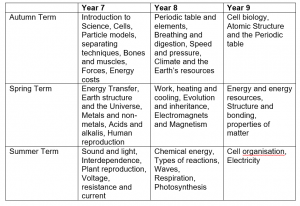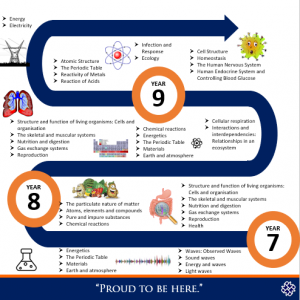Key Stage 3: Science
Curriculum Intent
The Science Department at Murray Park School aims to ensure that every student is able to understand and critically evaluate any scientific problem they may be faced with in an ever-changing, modern world. Through the National Curriculum Programme of Study, we seek to provide an inspiring range of experiences both in and outside the classroom.
Science, whether it is biology, chemistry or physics is a fascinating, ever-growing and ever-developing field of study. The range of careers that come from studying Science are always at the forefront of the media, for example, government, world affairs, community and personal mental and physical health. We want to give students the experience and hence the opportunities to develop their scientific knowledge in addition to enhancing their enquiry, descriptive, explanatory, analytical, mathematical and evaluation skills. Our students will learn about different scientific concepts so that they are able to discuss current affairs relating to nature, the environment and health in addition to other scientific disciplines which are vital to the development and the future of our planet.
The curriculum is challenging and so is the subject. However, our curriculum evokes curiosity and questioning from the students so that they experience a depth and breadth of scientific knowledge. The Science Department at Murray Park School is committed to ensuring that all students learn a wealth of skills and knowledge across both key stages by studying this exciting subject. We uphold and display the values of the School and encourage the students to also be bold at every possible opportunity within our subject area.
The national curriculum for science aims to ensure that all students:
- develop scientific knowledge and conceptual understanding through the specific disciplines of biology, chemistry and physics;
- develop understanding of the nature, processes and methods of science through different types of science enquiries that help them to answer scientific questions about the world around them;
- are equipped with the scientific knowledge required to understand the uses and implications of science, today and for the future.
Curriculum Overview
During key stage 3 the students will follow the National Curriculum. They will be able to demonstrate knowledge and understanding of scientific concepts, terms and issues. This will be achieved through the development of experimental skills and embedding knowledge that can be described and explained using key words and concepts.
The students will apply knowledge and understanding of terms and issues to contexts and actions. This will be achieved through the study of scenarios in various theoretical settings. In all areas of the science curriculum, numeracy and literacy skills will be used and developed in order to expand ideas and to formulate conclusions.
The third skill that the students will develop is the ability to analyse and to evaluate a range of evidence relating to scientific theory. This is achieved through exposure to a variety of data and evidence.
Year 7
The students will be introduced to the use of scientific equipment beyond key stage 2. They will learn how to carry out experiments safely in a laboratory and how to write up scientific experiments in a standard format which is used as a building block in the science industry. The students will begin to develop their skills of description and explanation of scientific concepts, such as, cells, particles, models and separating techniques as detailed in the table below.
Year 8
In this year, the students will further develop their descriptive and explanatory skills; this will be linked to how they apply their knowledge to different scenarios, for example, how they apply what they have learned about particle models to the concept of diffusion and/or gas pressure. The students will continue to develop these skills alongside their skills of research. They will learn how to conduct experiments safely which will provide them with practical evidence to accompany the knowledge that they will be gaining. The students will develop their mathematical skills in year 8 by using physics equations to calculate concepts such as speed.
Year 9
In year 9, the students will build upon the skills and knowledge that they have acquired over the last two years and they will develop skills which will support them in their GCSE studies. They will study atoms and their structure in more detail, energy transfer and a range of mathematical concepts, such as, energy efficiency and kinetic energy and they will develop their comparative skills. This will enable them to start to develop application, analytical and evaluation skills that will be required in their GCSE programme of study. Topics from the previous years will be expanded on and explored in greater detail.
KS3 Curriculum
Extra-curricular activities
We aim to supplement our broad curriculum with a range of extra-curricular activities to enrich our students’ experience and enjoyment of learning.
Our STEM (Science, Technology, Engineering and Maths) club runs every Wednesday lunchtime. The students undertake a variety of activities and they have the opportunity to achieve the CREST awards. CREST is a scheme that inspires students to think and to behave like scientists and engineers.
The ECO club runs once a week after school. By taking part in this club, the students undertake exciting projects and activities to see how they can contribute to the Earth’s sustainability.



